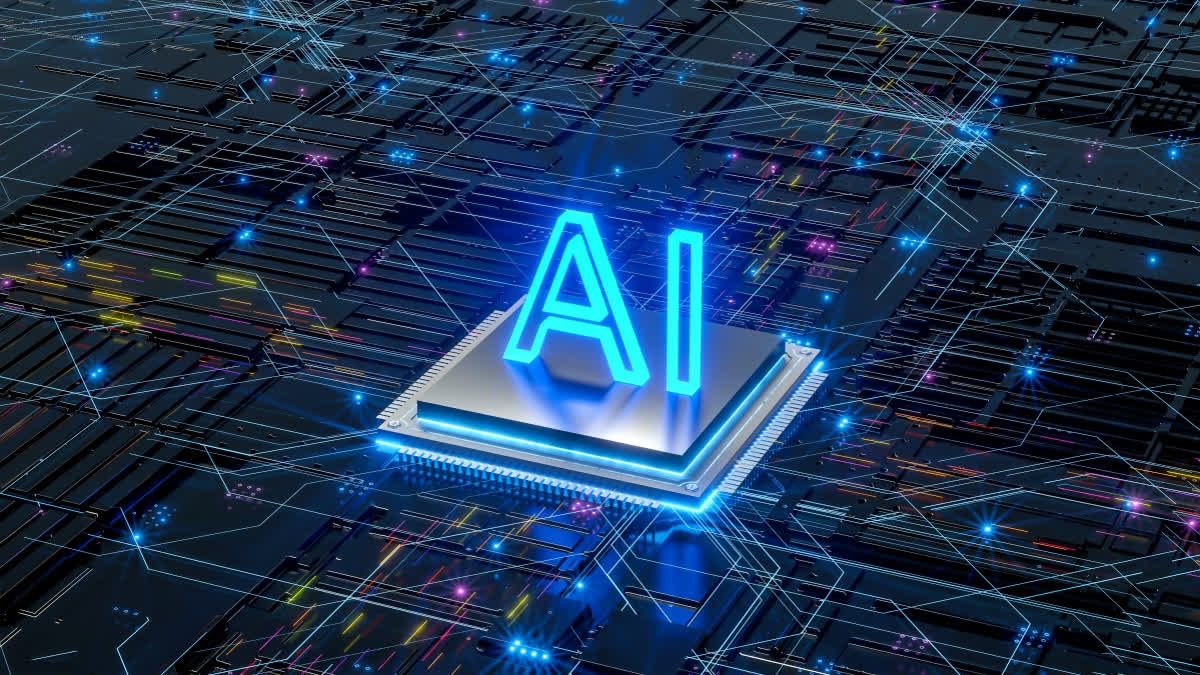Hyderabad: In recent decades, the debates around Artificial Intelligence (AI) have been persistent, evolving from speculative discussions to a tangible reality. However, the last 12 months saw the breathtaking advent of AI, particularly in the wake of advancements like ChatGPT sparking unprecedented enthusiasm.
From education to entertainment, from healthcare to finance, from agriculture to manufacturing, AI's omnipresence is increasingly evident, influencing diverse aspects of our lives. AI has demonstrated its potential to enhance human capabilities, solve complex problems, and create new opportunities. Let's delve deep into Artificial Intelligence and how it took centre stage when we think of big things from 2023.
History of Artificial Intelligence
AI, whose origin can be traced back to the 1950s when computer scientist John McCarthy coined the term 'Artificial Intelligence.' Early pioneers envisioned machines that could emulate human thinking and learning processes, leading to the exploration of tasks like chess playing and speech recognition. Subsequent decades saw the development of various AI technologies, including expert systems, neural networks, and natural language processing, applied in fields like medical diagnosis and image analysis.
In the 1960s, the world witnessed Eliza, the chatbot with cognitive capabilities, and Shakey, the first mobile intelligent robot. The decade between 1970 and 80 saw an AI winter followed by an AI renaissance. Speech and video processing came to the fore in the 1990s whereas IBM Watson, personal assistants, facial recognition, autonomous vehicles, and content and image creation rose in the 2000s. And here we are in 2023, heading to 2024 with one of the most advanced and powerful assets which has its consequences too.
Artificial Intelligence in 2023
The realm of AI witnessed transformative developments in the year 2023, mainly in open-source AI, licensing debates, and the evolution of generative AI models. The surge in open-source AI marked a pivotal shift, with PyTorch 2.0 setting a new industry standard and major contributions from tech giants like Microsoft and Google. Despite this progress, controversies emerged, notably with Meta's release of Llama 2, sparking debates on the true definition of open source in AI.
The licensing debates gained momentum as the industry grappled with the unique complexities presented by AI technologies. Meta's Llama 2, despite being celebrated as open source, faced scrutiny due to scalability limitations, prompting discussions on redefining licensing models to address these challenges.
The year also saw the rise of advanced generative AI models, reshaping natural language processing and creative content generation. OpenAI's GPT-4, an exceptional language model, showcased remarkable proficiency in text-based applications such as creative writing, coding, and complex problem-solving. Google soon launched GPT-4's rival, Gemini, which boasts to operate in five formats- text, audio, video, image and code.
However, this progress came with ethical concerns as the proliferation of generative AI models raised issues of bias in AI-generated content. The industry grappled with the imperative for transparency in AI development. 2023 marked a year of significant advancements and debates, shaping the trajectory of AI development and its ethical considerations for the future.
Industry sectors influenced by AI in 2023
AI witnessed its advancements in the healthcare sector, enhancing diagnostics and drug discovery. Tools like PathAI's system elevated cancer detection rates, while Atomwise's platform accelerated therapeutic identification. In finance, Virtu Financial was launched which utilises AI algorithms for precise trading, whereas Forter's solutions fortifies institutions against fraud, showcasing the sector's ongoing AI transformation.
Autonomous vehicles, led by Tesla and Waymo, saw advancements due to Artificial Intelligence. Tesla's Full Self-Driving system neared autonomy, while Waymo expanded self-driving services to new cities.
Education also took benefits of AI for personalised learning through platforms like Coursera and edX. AI played a pivotal role in addressing climate change too, improving predictions with platforms like ClimateAI and optimising energy consumption with systems like Verdigris.
Cybersecurity saw the rise of AI-driven solutions. Darktrace offered real-time threat detection, and Qualys' vulnerability scanners aided in proactive identification and patching. AI in art and creativity, exemplified by Aiva and Artbreeder's NFTs, prompted debates on art definition.
Surprising developments with the use of AI
Researchers at the University of British Columbia and BC Cancer have crafted an AI tool that achieves an 80 per cent accuracy in predicting cancer survival by analysing doctors' notes. An AI tool, outlined in Nature, forecasts the structures of 200 million proteins from a 23-terabyte database, unlocking avenues for drug development relying heavily on these structures.
Oxford University's AI exhibits a 400 per cent improvement in lip-reading accuracy compared to humans. Emotion AI, leveraging NLP, holds promise in healthcare, aiding the emotional assessment of patients, particularly those with neuro-diverse conditions, and potentially facilitating mental health evaluations.
What to expect from AI in the coming years?
Artificial Intelligence holds huge promise for the future, yet it grapples with several challenges. AI is anticipated to permeate various sectors, such as healthcare, finance, education, military, cyber security, transportation, and advertising. The transformative impact of AI is evident, with the potential to revolutionise industries and reshape the job market through automation.
In the healthcare sector, AI is positioned to address challenges like the shortage of qualified medical professionals and limited access to healthcare facilities. Through AI-driven diagnostics, individuals can receive preliminary assessments based on data from fitness bands or medical histories, facilitating timely and informed medical interventions.
The education sector will also be further evolved with the help of AI, which is set to transform traditional schooling, making education more effective and tailored to individual abilities. This shift can create opportunities for both high-achieving students and those facing challenges, enhancing overall educational outcomes.
In the financial realm, AI is making strides, particularly in fund management. AI algorithms analyse vast datasets to optimise investment strategies, outperforming human supervisors.
The military and cyber security domains are witnessing the emergence of AI-assisted technologies, including autonomous weapon systems. On the other hand, transportation is also undergoing a rapid transformation with the advent of self-driving vehicles. AI is playing a pivotal role in connected cars, offering predictive systems for component failures, route planning, and disaster prevention.
In advertising, AI-powered systems leverage historical data to optimise campaigns, reducing the uncertainty associated with traditional marketing approaches. Smart sentiment analysis tools facilitate targeted outreach, lead generation, and competitive research, revolutionising how brands connect with consumers.
While the future of AI is promising, addressing ethical concerns, ensuring transparency in algorithms, and creating a balance between technological innovation and societal well-being will be critical for a successful and sustainable integration of AI across diverse sectors.
Learning from the Key Statistics of Artificial Intelligence
According to a report by Techopedia, the global AI market is poised to reach $1.35 trillion by 2030, contributing an estimated $15.7 trillion to the global economy.
AI Growth Landscape
- According to Grand View Research, Artificial intelligence experiences unprecedented growth, with a market value of $136.55 billion, projecting a 37.3 per cent CAGR (Compound Annual Growth Rate) from 2023 to 2030.
- Market predictions from various sources range from $962 billion to $1.87 trillion by 2030, showcasing diverse perspectives on AI's future value.
- AI wearables are anticipated to reach $180 billion globally by 2025.
- The social media AI market is projected to hit $12 billion by 2031, reflecting a 28.7% CAGR from 2022 to 2031.
Business Landscape and Adoption
- According to the NewVantage Partners Annual Survey, 91 per cent of leading organisations invest in AI activities, with 92 per cent reporting returns on these investments.
- Global AI adoption rose to 35 per cent in 2022, up by 4 percentage points from the previous year, as reported by IBM.
- 97 per cent of business owners believe ChatGPT will positively impact their operations.
- Deloitte’s State of AI in the Enterprise reports that 94 per cent of business leaders foresee AI's importance for success in the next five years.
Economic Impact and Predictions
According to the PwC’s Global AI Study, AI could contribute an additional $15.7 trillion to the global economy by 2030, with significant GDP gains in China (26 per cent) and North America (14.5 per cent). Productivity improvements and enhanced products are expected to drive these gains, constituting nearly 70% of the global impact.
More Year-enders from 2023


